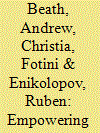|
|
|
Sort Order |
|
|
|
Items / Page
|
|
|
|
|
|
|
| Srl | Item |
| 1 |
ID:
096488


|
|
|
| 2 |
ID:
127807


|
|
|
|
|
| Publication |
2013.
|
| Summary/Abstract |
In societies with widespread gender discrimination, development programs with gender quotas are considered a way to improve women's economic, political, and social status. Using a randomized field experiment across 500 Afghan villages, we examine the effects of a development program that mandates female participation. We find that even in a highly conservative context like Afghanistan, such initiatives improve outcomes specific to female participation in some economic, social, and political activities, including increased mobility and income generation. They, however, produce no change in more entrenched female roles linked to family decision-making or in attitudes toward the general role of women in society.
|
|
|
|
|
|
|
|
|
|
|
|
|
|
|
|
| 3 |
ID:
089082


|
|
|
|
|
| Publication |
2009.
|
| Summary/Abstract |
After seven years of the Bush administration's neglect and mismanagement of Afghanistan, President Barack Obama was prompt in ordering the deployment of 21,000 more U.S. troops. Over 55,000 U.S. soldiers will soon be on the ground there. The replacement of General David McKiernan with General Stanley McChrystal at the head of U.S. operations in Afghanistan is also intended to increase force projection there. The United States' allies are under pressure to follow suit, if not with combat troops, then at least with training and money. All are concerned about the Taliban's recent success at persuading thousands of young Afghan men to sacrifice themselves to fight the foreign occupation. The Taliban's followers have pushed the Afghan government and its allies out of large swaths of the countryside and crept up to the gates of Kabul, bringing an alternative administration and sharia courts to the vacated areas. The Taliban leader Mullah Muhammad Omar recently offered, ironically, to give safe passage to NATO forces that choose to leave the country, just as the mujahideen offered safe passage to Soviet troops two decades ago.
|
|
|
|
|
|
|
|
|
|
|
|
|
|
|
|
| 4 |
ID:
140711


|
|
|
|
|
| Summary/Abstract |
Over the past two decades, community-based approaches to project delivery have become a popular means for governments and development agencies to improve the alignment of projects with the needs of rural communities and to increase the participation of villagers in project design and implementation. This article briefly summarizes the results of an impact evaluation of the National Solidarity Programme (NSP), a community-driven development programme in Afghanistan that created democratically-elected community development councils and funded small-scale development projects. Using a randomized controlled trial across 500 villages, the evaluation finds that NSP had a positive effect on access to drinking water and electricity, acceptance of democratic processes, perceptions of economic well-being and attitudes towards women. Effects on perceptions of local and national government performance and material economic outcomes were, however, more limited or short-lived.
|
|
|
|
|
|
|
|
|
|
|
|
|
|
|
|
|
|
|
|
|